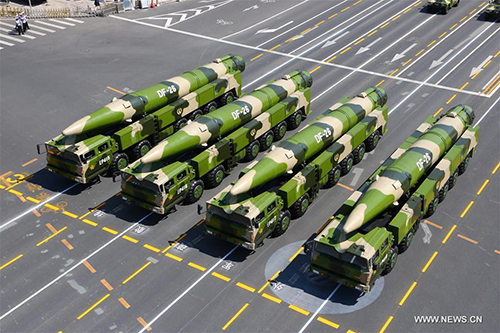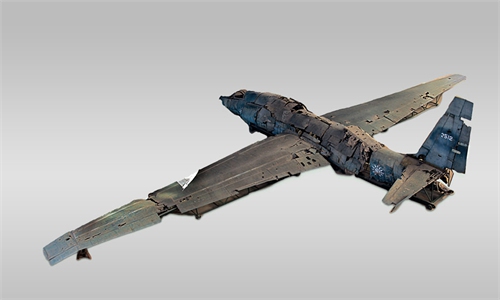Reported PLA anti-ship ballistic missile launches 'show saturated attack capability'

File photo taken on Sept. 3, 2015 shows DF-26 missiles attending a military parade in Beijing, capital of China. (Xinhua)
The Chinese People's Liberation Army (PLA) on Wednesday launched multiple anti-ship ballistic missiles into the South China Sea in a military exercise, overseas media reported. The missile launches, if true, demonstrated the PLA's ability to hit maritime targets with powerful ballistic missiles from multiple directions in coordinated, saturated attacks against which there is no defense, analysts said on Thursday.
US media outlet Bloomberg reported on Wednesday, citing an anonymous US defense official, that China launched four medium-range ballistic missiles into the South China Sea.
As a part of broader military exercises, the missiles landed in the sea in an area between South China's Hainan Island and the Xisha Islands, according to the report.
The PLA exercises are being held in the waters from Monday to Saturday, according to a navigation restriction notice released by the Hainan Maritime Safety Administration on Friday, which did not provide further details regarding the drills.
Citing an anonymous source "close to the Chinese military," the Hong Kong-based South China Morning Post claimed that China launched a DF-26 missile from Northwest China's Qinghai Province and a DF-21D missile from East China's Zhejiang Province into the South China Sea on Wednesday morning.
The PLA had not confirmed the launches as of press time.
China's DF-26 and DF-21D are the world's first ballistic missiles capable of targeting large and medium-sized vessels, earning them the title of "aircraft carrier killers," military observers said.
Song Zhongping, a Chinese military expert and TV commentator, told the Global Times on Thursday that using different missiles launched from different regions in attacking targets in the same area showed the PLA tactic of saturated attack.
China can use different ways to attack one or more targets at the same time, so the enemy will not be able to intercept these attacks, Song said, noting that despite US aircraft carriers' air defense capability, they cannot defend themselves against ballistic missiles.
A Beijing-based military expert told the Global Times on Thursday on condition of anonymity that the coordinated attack also showed China has a complete system to detect, track and lock on enemy ships. The system, which possibly consists of reconnaissance aircraft, radar, satellites and warships among others, can direct and coordinate missiles to find moving maritime targets, so they can adjust their trajectories when initiating the final attacks after re-entry.
On Wednesday morning, the time of the reported missile launches, the US sent an RC-135S ballistic missile-detection plane to the South China Sea. Chinese military analysts speculated that the US believed the PLA would launch anti-ship ballistic missiles like the DF-21D or the DF-26 in the drills.
Fu Qianshao, a Chinese military aviation expert, told the Global Times at that time that China is the only country that has the technology to develop anti-ship ballistic missiles, and the US is eager to learn about China's methods.
Some of the reports hyped the "China threat" in the South China Sea, but it is the US that has sent aircraft carriers and spy planes to the region, which brings instability, analysts noted.
In July, a US dual aircraft carrier strike group featuring the USS Ronald Reagan and the USS Nimitz conducted exercises in the South China Sea. The USS Ronald Reagan again entered the South China Sea on August 14 after sailing in the East China Sea near the island of Taiwan, according to the monitoring of Beijing-based think tank the South China Sea Strategic Situation Probing Initiative.
The US has also frequently sent spy planes near China for close-up reconnaissance.
Chinese Defense Ministry spokesperson Wu Qian said at a regular press conference on Thursday that recent Chinese military exercises are routine and not targeted at any country.



